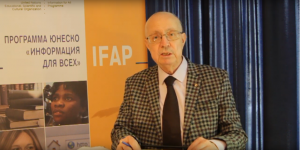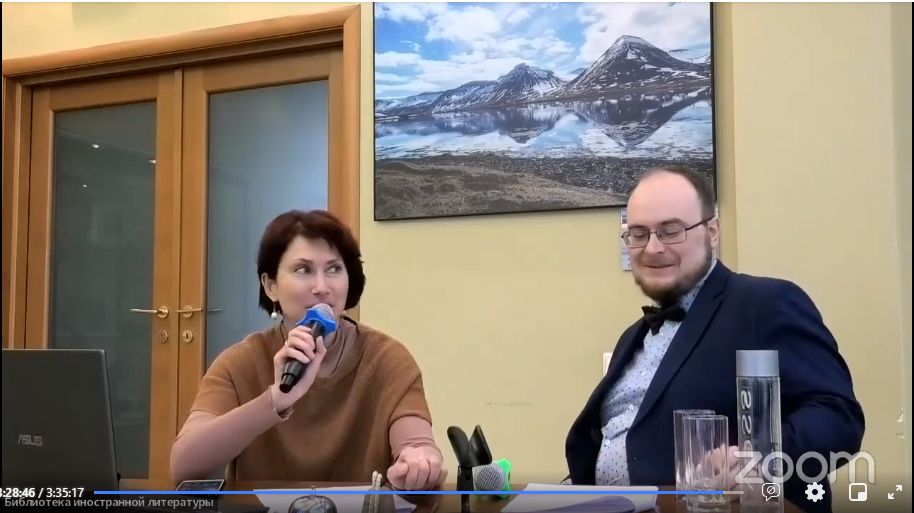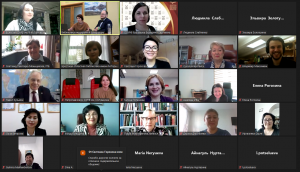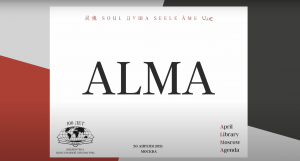Круглый стол по участию российских библиотек в работе Всемирного библиотечного и информационного конгресса ИФЛА 2021 г.
Пост-релиз
В преддверии Всемирного библиотечного и информационного конгресса ИФЛА (17-19 августа 2021 г., онлайн-формат) в Библиотеке иностранной литературы прошел методический круглый стол по участию российских библиотек в работе Конгресса. Организаторами встречи традиционно выступили Центр библиотековедения и профессионального взаимодействия БИЛ, Русскоязычный центр ИФЛА в РГБ и Секция РБА по международному сотрудничеству.
Это профессиональное событие состоялось 10 августа 2021 г. в гибридном формате: в Библиотеке иностранной литературы и на платформе Zoom. Его участниками стали более 90 человек, в том числе члены профессиональных структурных подразделений ИФЛА, российские библиотечные специалисты из Москвы, Санкт-Петербурга, Новосибирска, Владивостока, Перми, Калуги, Калининграда, Рязани, Саратова, Сахалина, Петрозаводска, Норильска, Сыктывкара, Боголюбово, Томска, Тюмени, Краснодара, Астрахани, Сургута, Пскова, Самары, Омска, Нижнего Новгорода, Орла, Екатеринбурга, Ростова, представители профильных вузов и СМИ.
Вела встречу Светлана Анатольевна Горохова, советник генерального директора Библиотеки иностранной литературы, ученый секретарь по международной деятельности Центральной городской публичной библиотеки имени В. В. Маяковского, член Правления РБА, председатель Секции РБА по международной деятельности.
Участников приветствовали генеральный директор Библиотеки иностранной литературы Павел Леонидович Кузьмин; президент Российской библиотечной ассоциации, директор Государственной публичной исторической библиотеки Михаил Дмитриевич Афанасьев; генеральный директор Российской государственной библиотеки, вице-президент РБА Вадим Валерьевич Дуда.
П.Л. Кузьмин упомянул, что Библиотека иностранной литературы отмечает в этом году своё 100-летие и отметил вклад, который она вносит в продвижение работы Федерации в России и представлении достижений российских библиотек за рубежом. Основательница Библиотеки Маргарита Ивановна Рудомино была делегатом первой встречи членов ИФЛА в Эдинбурге в 1927 году, впоследствии – вице-президентом ИФЛА, привезла Всемирный библиотечный и информационный конгресс ИФЛА в советскую Россию в далеком 1972 году. Библиотека иностранной литературы отмечает 120-летие Маргариты Ивановны и это профессиональная встреча – дань ее работе. Не менее успешно продолжалась взаимодействие Иностранки с ИФЛА и во время директорства Е.Ю. Гениевой, также являвшейся первым вице-президентом ИФЛА, положившей начало массовому участию региональных библиотек России во Всемирных библиотечных Конгрессах Федерации. Генеральный директор ВГБИЛ заверил участников круглого стола, что Библиотека иностранной литературы будет продолжать серьезную работу с ИФЛА и другими международными профессиональными организациями. Именно с этой целью в структуре библиотеки создан Центр библиотековедения и профессионального взаимодействия, в задачи которого входит аналитическая переработка информации по зарубежному библиотековедению, консультирование и создание кастомизированных программ профессионального развития для библиотек регионов России.
М.Д. Афанасьев отметил, что у Советского Союза и России были разные по активности и успешности периоды участия в работе ИФЛА и её ежегодных конгрессах. И в настоящее время Россия опять переживает подъем благодаря в том числе интенсивной работе Секции РБА по международному сотрудничеству и её председателя С.А. Гороховой. Однако дистанционный формат предстоящего конгресса ИФЛА – это серьёзный старт для всех нас, принципиально новая ситуация. В отличие от прошлых конгрессов, которые проходили в очном формате, и в ходе которых участники могли встречаться и общаться друг с другом, как в рабочей, так и в неформальной среде, в этот раз каждый участник будет находиться за своим персональным устройством и сможет оценивать присутствие представителей других стран по их активному участию в дискуссиях и записям в чате, по тому, насколько они демонстрируют заинтересованность в сотрудничестве. Президент РБА высоко оценил результаты выборов 2021 года в структурные подразделения Федерации. Российские специалисты поддержали традиции присутствия в постоянных комитетах секций и вступили в новые, выдвинулись на руководящие посты. М.Д. Афанасьев выразил уверенность, что аудитория данного мероприятия понимает, что участие в работе ИФЛА – важный элемент нашего профессионального развития и необходимое условие движения в будущее.
В.В. Дуда рассказал о планах работы по продвижению интересов российского библиотечного сообщества в рамках своей будущей деятельности во впервые созданной в составе ИФЛА структуре – Европейском отделе Регионального совета ИФЛА. Он отметил, что наличие региональных отделов в структуре ИФЛА крайне важно для обмена профессиональным опытом развития международного сотрудничества и адвокации библиотек. Генеральный директор Российской государственной библиотеки убеждён, что российское библиотечное сообщество достаточно сильно и опытно, чтобы определять собственную повестку ежегодного конгресса ИФЛА и задавать тон. Он напомнил о ярких инициативах предыдущих конгрессов, например, о выставочном стенде РБА, о знаковых докладах и презентациях, которые вызывали большой интерес участников конгрессов. Нужно обязательно находить возможности и ресурсы, чтобы продолжать такие инициативы и выступать на достойном уровне. В.В. Дуда подчеркнул, что России есть о чем говорить на площадках ИФЛА, в том числе о Стратегии развития библиотечного дела и её ключевых направлениях, которые актуальны для работы абсолютно всех национальных библиотечных сообществ. В заключение В.В. Дуда поздравил заместителя декана библиотечно-информационного факультета Санкт-Петербургского государственного института культуры А.С. Крымскую с избранием на пост председателя Постоянного комитета Секции ИФЛА по образованию и подготовке кадров.
Об особенностях и новых возможностях, который впервые проводится в онлайн-формате, рассказала в своём видеообращении заместитель генерального секретаря ИФЛА Хелен Мандл. Она особенно подчеркнула, что в этом году участие в конгрессе стало доступно большому количеству профессионалов со всего мира. Если раньше стоимость участия в конгрессе состояла из оплаты регистрационного взноса (500 евро и более, в зависимости от вида членства), а также оплаты расходов на трансфер, проживание и питание в стране его проведения, то в 2021 году участники-члены ИФЛА должны будут заплатить только регистрационный взнос в размере 85 евро. При этом они получат доступ ко всем мероприятиям конгресса не только в дни его проведения (17 – 19 августа), но и в течение всего следующего года. Программа конгресса построена таким образом, что мероприятия будут проходить в течение трех дней, некоторые из них будут повторяться в записи для участников, которые находятся в разных часовых поясах.
Комментируя видеообращение, Ирина Владимировна Гайшун, начальник международного отдела Российской государственной библиотеки, координатор Русскоязычного центра ИФЛА при РГБ, рассказала об отличительных особенностях конгресса в этом году. В частности, о том, что ряд профессиональных мероприятий записан заранее и будет транслироваться в записи, а в некоторых можно будет принять участие онлайн. Кроме того, участники смогут задавать вопросы в ходе специально организованных сессий на платформе Zoom. Все мероприятия будут сопровождаться субтитрами на 7 официальных языках ИФЛА, в том числе на русском языке.
Главной задачей круглого стола было ознакомление российских библиотечных специалистов с содержанием программы Конгресса ИФЛА, с этой целью были приглашены российские специалисты – члены секций ИФЛА, которые рассказали о том, какие мероприятия приготовили их секции к предстоящему конгрессу. В течение многих лет Россия проявляет высокую активность, принимая участие в работе структурных подразделений ИФЛА. Так на сегодняшний день наши специалисты успешно представляют достижения российских библиотек в 32 Постоянных комитетах секций ИФЛА. Пятеро из них были приняты в Постоянные комитеты в 2021 году на первый 4-х летний срок, ещё трое в 2021 году были переизбраны на следующий срок.
В ходе круглого стола выступили с сообщениями 13 представителей Постоянных комитетов. Была представлена профессиональная программа и связанная с ней деятельность следующих секций:
- Секция по управлению библиотечными ассоциациями
Афанасьев Михаил Дмитриевич, президент Российской библиотечной ассоциации, директор Государственной публичной исторической библиотеки России, член Постоянного комитета Секции по управлению библиотечными ассоциациями, 2019 – 2023 (1)
- Секция по непрерывному образованию и обучению на рабочем месте Горохова Светлана Анатольевна, советник генерального директора Библиотеки иностранной литературы, ученый секретарь по международной деятельности Центральной городской публичной библиотеки имени В. В. Маяковского, член Правления РБА, член Постоянного комитета Секции по непрерывному профессиональному развитию и обучению на рабочем месте, 2017 – 2021 (1)
Белякова Дарья Александровна, руководитель Центра библиотековедения и профессионального взаимодействия Всероссийской государственной библиотеки иностранной литературы им. М.И. Рудомино, член Постоянного комитета Секции по непрерывному профессиональному развитию и обучению на рабочем месте, 2019 – 2023 (1)
- Секция детских и юношеских библиотек
Алексеева Мария Викторовна, заведующая центром международных программ Российской государственной библиотеки для молодежи, член Постоянного комитета Секции детских и юношеских библиотек ИФЛА, 2019 – 2023 (1)
- Секция грамотности и чтения
Пономаренко Мария Борисовна, главный библиограф Центра детской книги и детских программ Всероссийской государственной библиотеки иностранной литературы им. М.И. Рудомино, член Постоянного комитета Секции грамотности и чтения ИФЛА, 2021 –2025 (1)
- Секция справочных и информационных служб
Косенко Дмитрий Витальевич, главный библиограф первой категории Отдела формирования и обработки информационных ресурсов Президентской библиотеки им. Б.Н. Ельцина, член Постоянного комитета Секции справочных и информационных служб, 2021 – 2025 (1)
Нещерет Марина Юрьевна, ведущий научный сотрудник центра по исследованию проблем развития библиотек в информационном обществе Российской государственной библиотеки, член Постоянного комитета Секции по библиографии 2019 – 2023 (1)
- Секция редких книг и специальных коллекций
Рамазанова Джамиля Нуровна, заведующая научно-исследовательским отделом редких книг Российской государственной библиотеки, член Постоянного комитета Секции редких книг и специальных коллекций, 2017 – 2021 (1), 2021 – 2025 (2)
- Секция библиотек, обслуживающих людей с проблемами чтения плоскопечатных текстов
Елфимова Галина Сергеевна, заместитель директора по научной работе, Российская государственная библиотека для слепых, член Постоянного комитета Секции библиотек, обслуживающих людей с проблемами чтения плоскопечатных текстов, 2019-2023 (1)
- Секция библиотек по общественным наукам
Шибаева Екатерина Александровна, заместитель главного редактора – ответственный секретарь отдела периодических изданий Департамента – Издательство «Пашков Дом» Российской государственной библиотеки, член Постоянного комитета Секции библиотек по общественным наукам, 2021 – 2025(1)
Эсман Карина Анриевна, главный библиотекарь-каталогизатор Отдела обработки и каталогов Российской национальной библиотеки, член Постоянного комитета Секции по каталогизации, 2019 – 2023 (1)
- Секция по сохранности и консервации
Колпакова Мария Игоревна, заведующая сектором изучения зарубежного опыта и методических разработок Центра консервации и реставрации документов Всероссийской государственной библиотеки иностранной литературы им. М.И. Рудомино, член Постоянного комитета Секции по сохранности и консервации, 2021 – 2025 (1)
- Секция по образованию и подготовке кадров
Крымская Альбина Самиуловна, заместитель декана библиотечно-информационного факультета Санкт-Петербургского государственного института культуры, член Постоянного комитета Секции по образованию и подготовке кадров, 2017 – 2021 (1), председатель Постоянного комитета Секции по образованию и подготовке кадров, 2021 – 2025 (2)
Подводя итоги круглого стола, ведущая Светлана Анатольевна Горохова призвала руководителей российских библиотек регистрировать себя и своих сотрудников, занимающихся вопросами методического сопровождения деятельности библиотек, для дистанционного участия во Всемирном библиотечном и информационном конгрессе ИФЛА, использовать возможности онлайн-участия для того, чтобы поделиться уникальным опытом российских библиотек с мировым библиотечным сообществом, расширить профессиональные международные контакты, получить представление о достижениях и тенденциях развития зарубежных библиотек. Она подчеркнула, что участие российских специалистов в этом году в конгрессе ИФЛА станет для всего мирового библиотечного сообщества показателем нашей профессиональной активности и заинтересованности.
Руководитель Центра библиотековедения и профессионального взаимодействия Библиотеки иностранной литературы Дарья Александровна Белякова предложила участникам встречи обращаться за консультациями по участию в конгрессе, за помощью в освоении содержания информационных материалов конгресса и в налаживании рабочих контактов с участниками Конгресса ИФЛА из других стран.
Организаторы круглого стола предлагают ознакомиться с дополнительной информацией о предстоящих мероприятиях Конгресса ИФЛА и деятельности профессиональных подразделений Федерации, которая содержится в Приложении 1.
Вы можете ознакомиться с видеозаписью Круглого стола с презентациями спикеров в любое удобное для вас время.
Appendix




